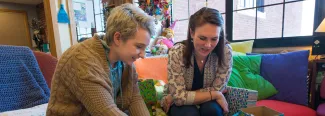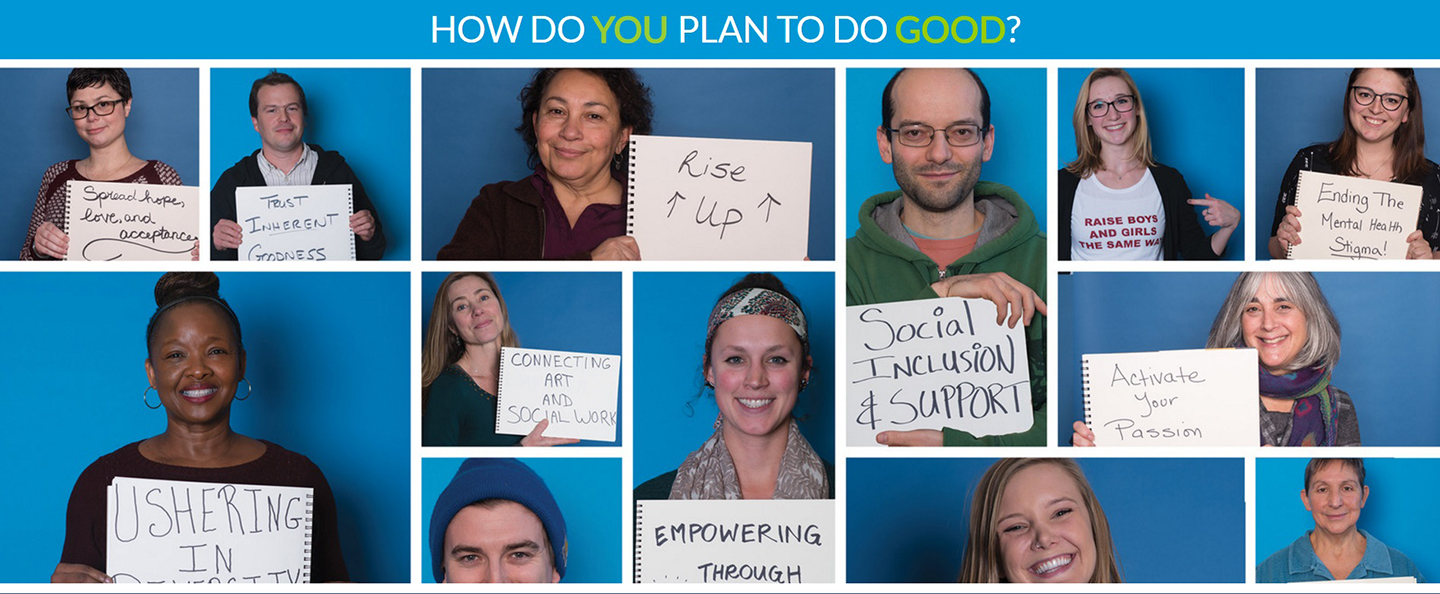 Becoming Great at Doing Good: Making Change in Real Time
Becoming Great at Doing Good: Making Change in Real Time
In this Issue
News and Happenings
- Shelley Cohen Konrad Discusses New Research with WCHS.
- Huffington Post: Escaping Forced Marriage
- Charlotte Warren - New Report Details Serious Deficiencies At South Portland Youth Corrections Facility
- UNE School of Social Work on Instagram
- Empowering Cultural Education Course Launches!
- CCPH Partners with PCORI
Opportunities & Information
News and Happenings
UNE’s Shelley Cohen Konrad speaks with ‘WCSH’ about latest screen time research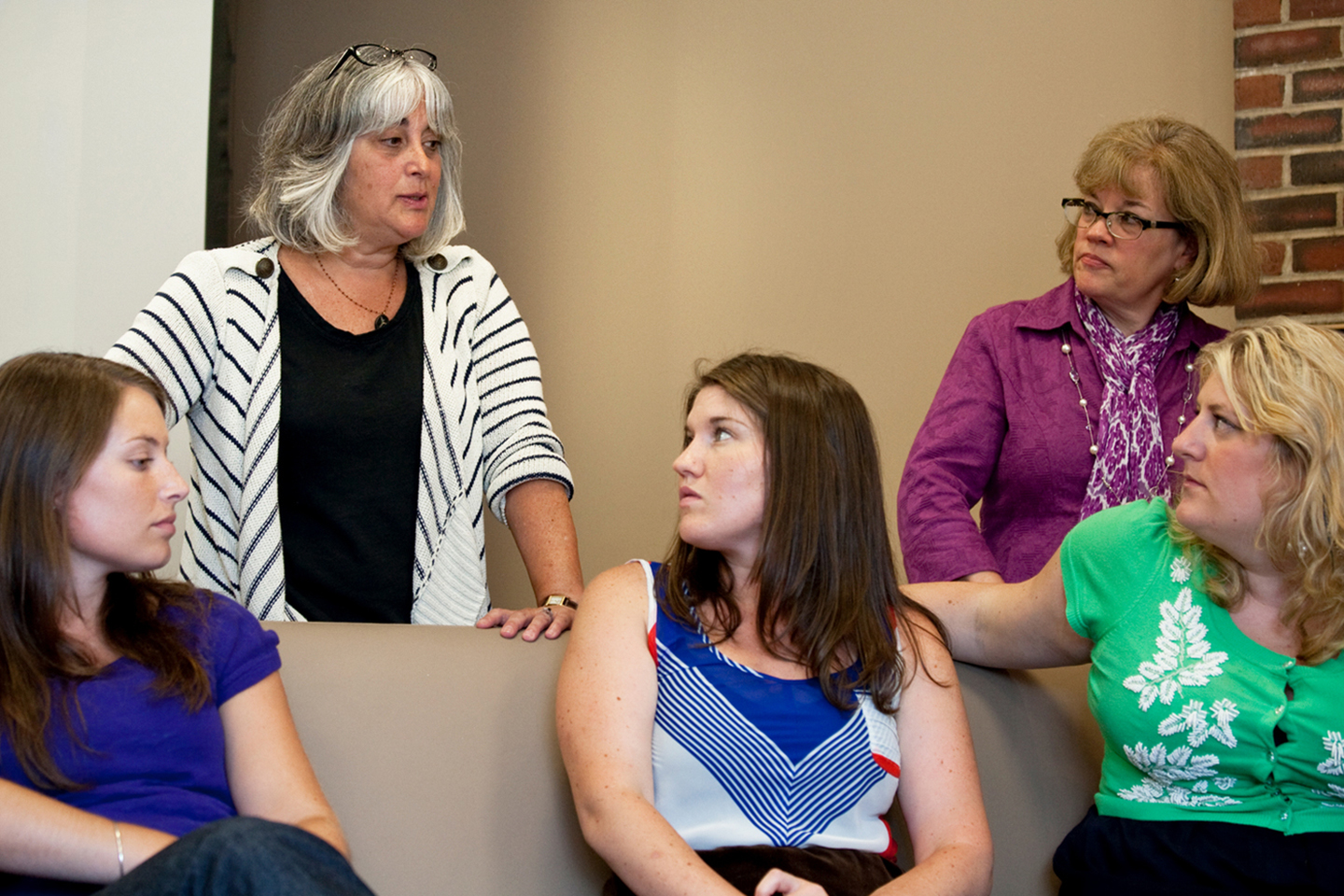
According to a recently released study, there is a correlation between the amount of time that teenagers spend on their cellphones or digital devices and their likelihood of feeling depressed or having suicidal thoughts. As an expert in the field of child and family social work, Shelley Cohen Konrad, Ph.D., LCSW, FNAP, director of the School of Social Work and the Center for Excellence in Collaborative Education (CECE), was interviewed by WCSH about these findings.
“We're seeing more and more kids who are feeling socially isolated," said Cohen Konrad. "There's a huge sea change in terms of what's happening socially, what's happening in terms of attachment and how families function together."
The study, which was conducted by researchers from Florida State University and San Diego State University, investigated the attitudes and behaviors of more than 500,000 teens across three generations dating back to 1991. Looking at the activities that were most linked to depression or suicidal thoughts, researchers found a link between mobile phone use and a rise in depression. Time spent using digital devices was an especially important indicator, as nearly half (48 percent) of teens who spent at least five hours a day on an electronic device reported thinking about or attempting suicide. For teens who only spent an hour a day in front of a screen, this figure dropped to 28%.
Cohen Konrad emphasized the importance of parental involvement, particularly in regard to social media usage by children and teens. “I think it gives kids total access — unless their parents are diligent — to a wide array of things that they are really not developmentally ready for. I think it creates a competitive nature and a materialistic nature — like what is important in life becomes what you have and not what you do," she said.

Escaping Forced Marriage in the DRC to Pursue a Dream: Portrait of a Young Immigrant Congolese Woman — by SSW Special Projects Staff Megan Webster
“It happened to me when I was 18. They came to claim me” Asha, 22 now, tells me from across the kitchen table of her Portland, Maine apartment. Her friend, who she now refers to as sister, stands above her weaving Brazilian extensions into her hair. Light from the small window across the room illuminates her wisps a fiery amber gold- the only light in the room. The bulb broke just this morning, they tell me, apologetically through warm smiles, extending a basket of smoked turkey tails to taste.
Charlotte Warren — New Report Details Serious Deficiencies At South Portland Youth Corrections Facility
A newly released review of the Long Creek Youth Development Center in South Portland has found some serious deficiencies including conditions described as 'dangerous' and 'harmful' to staff and residents. The report also recommends that the state completely reassess its juvenile justice system, and state lawmakers who have reviewed the report say it is time for action.
UNE SCHOOL OF SOCIAL WORK IS ON Instagram!
Please follow unesocialwork to stay updated on our unique, inclusive, student-centered social work program!
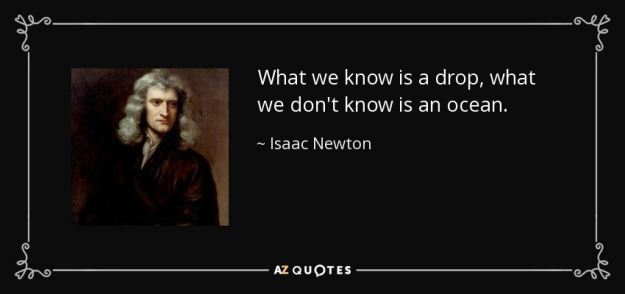 Empowering cultural education course launches!
Empowering cultural education course launches!
January 24, 2018 marks the launching of the course Empowering Cultural Education
Ten students are enrolled in the course and it is open to professions outside just the field of social work. We have six social work students and four occupational therapy students enrolled. Regina Phillips M.S.W with be co-teaching with Social Work Professor, Arabella Perez L.C.S.W (be sure to check out our interview with Regina Phillips about teaching her first SSW Course!)
Students were assigned to read Courageous Conversations about Race-Singelton, Glenn pp 65-78(1) in preparation for the first course. We’ve already received feedback that having read that chapter prior to class better prepared them to approach the survey from a place of knowing “we don’t know what we don’t know.”
We look forward to more student insight as we pilot this course on Empowering Cultural Education. Stay tuned with updates on our blog: Empowering Cultural Education!
Community-Campus Partnerships for Health Joins forces with Patient Centered Outcomes Research Institute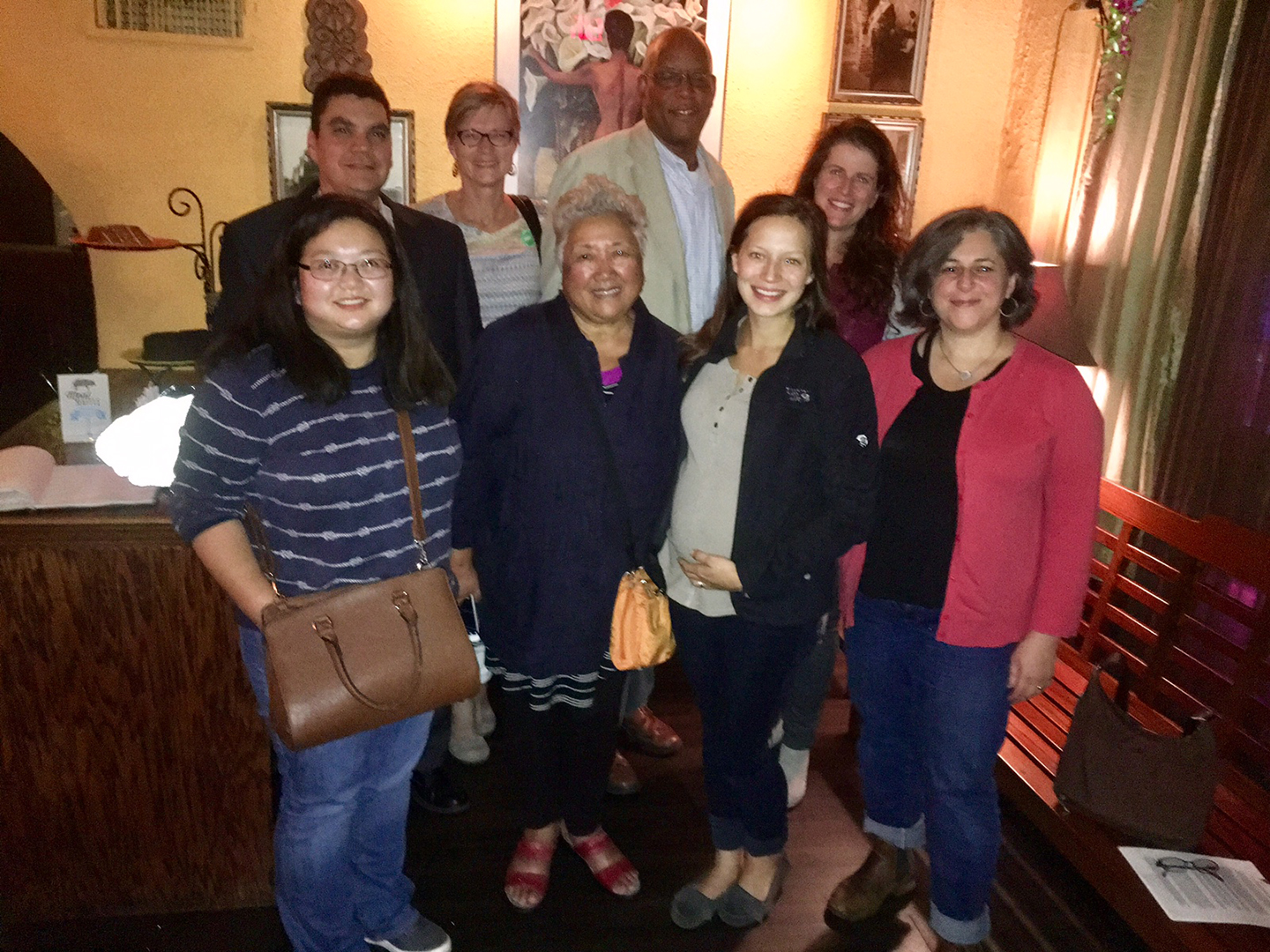
Community-Campus Partnerships for Health (CCPH) received a Eugene Washington PCORI Engagement Award by the Patient-Centered Outcomes Research Institute (PCORI) to support reducing health disparities by insuring culturally appropriate research that effectively engages diverse populations.
Al Richmond, Executive Director at CCPH will co-lead the engagement project with Nancy Shore, Senior Consultant at CCPH and Professor at University of New England’s School of Social Work. The project's objectives include:
- Gain an understanding of diverse patients’ visions of culturally appropriate research by convening listening sessions and community forums
- Develop guidelines for engagement of diverse patients in research, based on analysis of community members’ experiences and perspectives
- Identify strategies to build upon and apply these guidelines by convening dialogues with health researchers
- Draft training approaches to increase 1) knowledge of culturally appropriate research ethics and practices, and 2) the ability to adopt these guidelines into practice
- Disseminate guidelines for culturally appropriate research to diverse stakeholder groups, insuring products are accessible through innovative and traditional dissemination strategies.
These objectives and the overall project approach were identified in partnership with 2 community-based organizations: Ahuhui Malama I Ka Lokahi (Hawaiians for the Conservation of Native Ecosystems) based in Honolulu, HI and Somali, Latino and Hmong Partnership for Health & Wellness: Caafimad-Salud-Kev Nyob Zoo (SoLaHmo), West Side Community Health Services, Inc, based in Saint Paul, MN.
Students & Alumni
Congratulations to our December 2017 MSW graduates!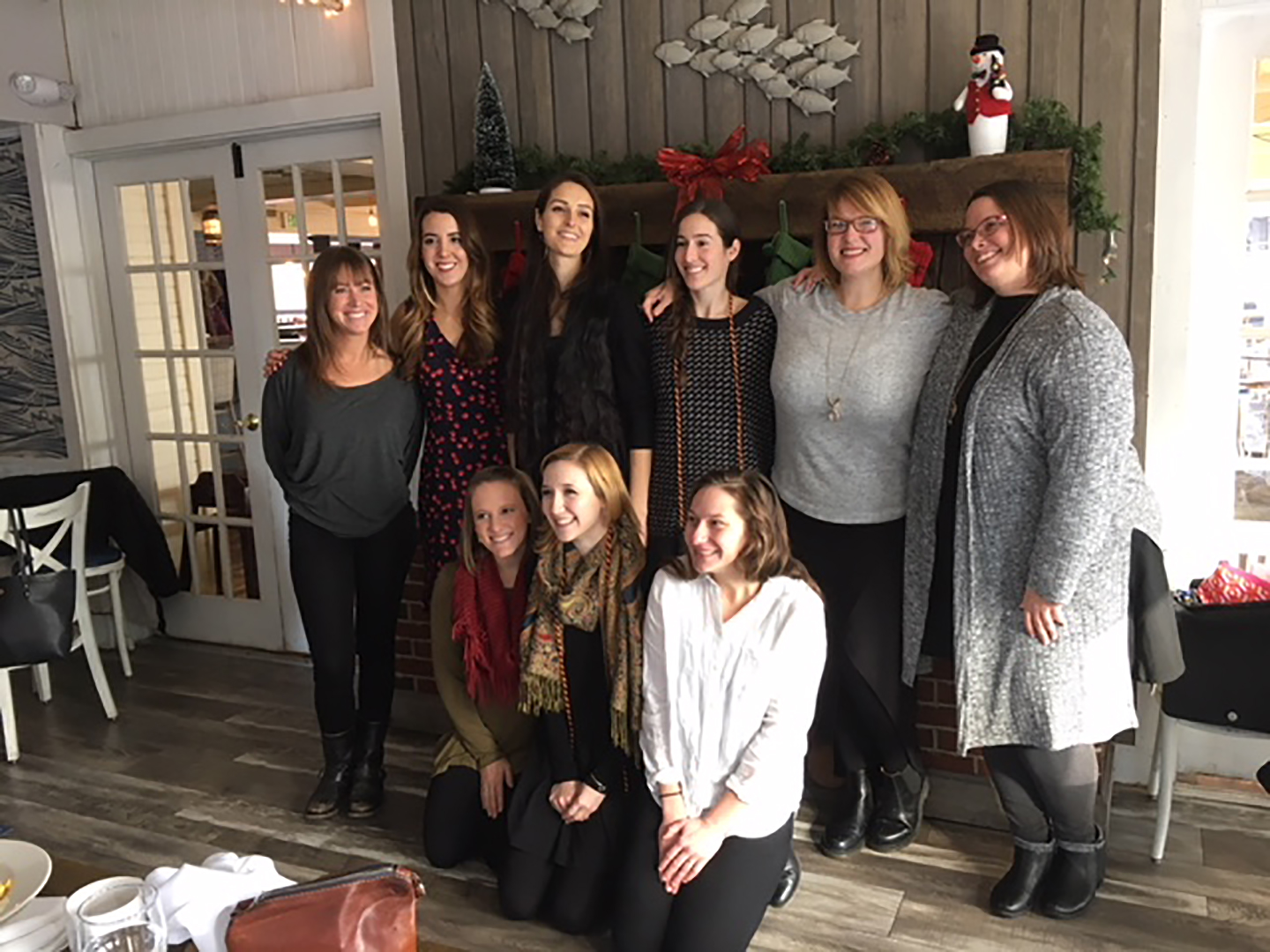
- Deanna Barry
- Karri Beling
- Katherine Clemens
- Cassandra Graham
- Elizabeth Hanz
- Courtney Leeman
- Nora McElroy
- Savannah Sargent
- Melissa Towle
- Sarah Walcott
Websites built by Policy II Online Students
The following websites were built by the University of New England Master of Social Work Online students. They address Transgender Rights, The Dreamers, and Health Care. Please enjoy these valuable resources.
MSW student Maya Williams — Interfaith Programming for Program Development Course
For Clay Graybeal’s Program Development course, in collaboration with the Intercultural Education Office, I have developed interfaith programming which will be implemented at UNE’s Interfaith Prayer and Reflection Room and other areas of campus. It will focus on spiritual check-ins for students bi-weekly, along with events for students to see how health professionals use an interfaith lens in their line of work.
How do health care centers facilitate the delicate balance between spiritual and physical wellness? Students are invited to a Q&A panel discussion to learn how chaplains in the medical field collaborate with social workers, nurses, doctors and other care providers to better address the health needs of spiritual patients.
First event, Faith and Healing: When Chaplains and Health Professionals Join Forces is with IPEC on February 8 at 5 p.m. in Innovation Hall 101, Portland Campus. (Snow date: February 15)
MSW Student Meghan Morash — Cultivating Connections: Drama Therapy with Eating Disorders
By Meghan D. Morash
This past semester I took the Program Development class with Professor Graybeal. He assigned us a project — create a program from scratch. The only rule, really, was to pick something that we were passionate about, as we'd be working on it all semester. My mind immediately jumped to theater, because that has been a lifelong love. I wasn't sure at first where I wanted to begin, but I quickly settled on the eating disorder population when I saw how many clients at my internship at Art of Awareness in South Portland struggled with this diagnosis. And so, Cultivating Connections — my program for using drama therapy with eating disorders — was born.
“Eating disorders are actually serious and often fatal illnesses that cause severe disturbance to a person’s eating behaviors” (NIMH, 2016). Further, those who struggle with disordered eating are often shunned and the topic is almost considered taboo — no one wants to talk about ED. It is my belief that those with eating disorders deserve a place where they can safely tell their stories, share their struggles, and name their disordered patterns. I propose creating a drama therapy group specifically for those who struggle with disordered eating.
The vision for the program is a safe place for all people to creatively work through their trauma and their eating disorders through theatrical play, movement, and voice. The mission is for trauma survivors and those struggling with eating disorders to use drama therapy as a means to connect with self and others, to cultivate healthy coping skills, and to use creative expression to regain their power and voice.
The objectives for Cultivating Connections are to increase interpersonal skills through theatrical play, movement, and voice; Empowerment of each individual; Cultivate connections between self and others; Gain perspective – not only in their own stories, but those of others as well; Reduce use of disordered eating behaviors as a coping mechanism and habit. These objectives would all be directly addressed throughout the process of drama therapy from the warm-up to, through the experiential exercise, and ending in the cool-down each evening. The inclusion of time for feedback during each session would also promote these objectives.
Meeting these objectives would be met by using theatrical play, movement, and vocal exercises to tell each person’s story. It would increase interpersonal skills by interacting with other players in the room and role-playing could also be used to play out the situations and getting a chance to play both parts. In doing this, the participants get a chance to not only re-play the part of themselves, but also the other person in the interaction that they are working through. The participants would cultivate connections by increasing interpersonal skills, interacting in a supportive environment where peer relationships can grow, and receiving information for resources for other local spaces in order to create more connections with others, which will also help to gain perspective. ED behaviors will be reduced by increasing coping skills and conversations with the eating disorder self through journaling and theatrical interaction.
Those who struggle with disordered eating patterns such as bingeing and purging or anorexia often feel they have completely lost control over some part, if not all, of their lives. Drama therapy would provide for an interactive and interpersonal way to reclaim control over their lives, which would be an empowering step towards recovery. Theater has the unique ability to connect to people’s innermost vulnerable places while still providing a mask to work behind, so to speak. Drama itself has been used for thousands of years to tell stories and to pass on information using oral history from one generation to the next. Drama therapy could work with those who are suffering from disordered eating as a means to speak to the multiple parts of themselves and to tell their stories.
So what is drama therapy exactly?
“Drama therapy is the intentional use of drama and/or theater processes to achieve therapeutic goals” (NADTA, n.d.). Drama therapy utilizes the mind-body connection, creates a fully immersive and firsthand experience, and is a tool for healing. With disordered eating, drama therapy works in that it allows the ‘actors’ to tell their stories in their own voice. It promotes self-expression using their full bodies and voices, problem solving, working individually and as a part of team, and achieving liberation from their disordered eating and trauma.
Why should I care about the theater arts in social work?
Theater provides an alternative method to traditional therapy; creates a venue for freedom to not be perfect; improves oral and literacy skills; stimulates memorization and retention of information; promotes self-expression and self-esteem; teaches the importance of teamwork and individual responsibility; explores emotions and personal views vs. worldviews; garner curiosity and a thirst for knowledge. Specifically applied to eating disorders, theater can be used to separate the eating disorder self from the healthy self for a full dialogue to occur between the two (Costin & Schubert-Grabb, 2011, pp. 37-38).
Storytelling helps to empower individuals, especially in communities that are often forced into silence, like those with eating disorders. Storytelling can help build collaborative interventions. The idea for the program is to begin as a one-night event that will begin with a theatrical style warm-up, an experiential activity, and concludes with a collective closing. The outline for this event is based around the importance of the central experiential activity, which is designed to increase interpersonal skills through theatrical play, movement, and voice.
Using drama therapy also incorporates use of the whole body. This can be the exact opposite feeling of what those struggling with eating disorders feel on an every day basis. “Our sense of agency, how much we feel in control, is defined by our relationship with our bodies and its rhythms” (van der Kolk, 2014, p. 331). So why drama therapy? It helps to develop skills for daily living like respect, empowerment, self-compassion, and control as well as improving mental, emotional, and physical health. When a person is better equipped to cope with their own stuff, they are likelier to be a more involved member of society as a whole.
Why do we need a program like this in Maine?
We are lacking the resources needed to assist those with eating disorders here in Maine. In Maine, there are no residential treatment programs for treating eating disorders. New England Eating Disorders (NEED) is the only intensive outpatient program (IOP) and partial hospitalization program (PHP) in Maine specifically for eating disorders. The good news is that NEED is working to develop space with a more residential component that would allow for in-state treatment.
The most recent legislation that I could find related to eating disorders was the Anna Westin Act of 2015. This legislation was introduced in 2015 to help Americans struggling with eating disorders get the care and support they need by focusing on training, treatment, and truth-in-advertising (Bipartisan, 2015). It was written into law on December 7, 2016. Since then, there do not appear to be any current policies set forth regarding eating disorders. I spoke with Dr. Kathleen Hart, President of the EDAM and I asked her if she knew of anyone who was doing anything in Maine regarding the treatment of eating disorders and she did not know (Morash and Hart, Eating Disorder Legislation in Maine). She told me that if anything was happening, they would be the ones with the information, but she did not have any. In the state of Maine, and across the country, we need more organizations like EDAM, NEED, and Art of Awareness who are leading the way for individuals to recover here in Maine, at home. My hope is that Cultivating Connections can be just another step towards creating the programs that we need.
References:
- Art of Awareness. (n.d.). Retrieved from http://www.artofawareness.org/
- Bipartisan, Congress. (2015, May 21). U.S. Reps. Ted Deutch, Ileana Ros-Lehtinen Introduce
- New Bipartisan Eating Disorders Legislation [Press release]. Retrieved from https://teddeutch.house.gov/news/documentsingle.aspx?DocumentID=398431
- Costin, C., & Schubert-Grabb, G. (2011). 8 Keys to Recovery From an Eating Disorder. S.I.: WW Norton.
- Eating Disorder Legislation in Maine [Telephone interview]. (2017, November 7).
- EDAM. (2013). Eating Disorders Association of Maine: Treatment Centers. Retrieved from
- http://maineeatingdisorders.org/treatment-centers/
- Hardina, D. (2013). Interpersonal Social Work Skills for Community Practice. New York, NY:
- Springer Publishing Company.
- Lyons, Libby. (2017, April 1). Update on Current Advocacy Work for Eating Disorders.
- Retrieved from https://www.eatingdisorderhope.com/blog/current-advocacy-eating-disorders
- NADTA. (n.d.). What is Drama Therapy? Retrieved from http://www.nadta.org/what-is-drama-
- therapy.html
- National Eating Disorders Association. (n.d.). Retrieved from
- https://www.nationaleatingdisorders.org/
- NEED. (n.d.). Retrieved from https://www.sweetser.org/need-program.php
- NIMH. (2016, February). Eating Disorders. Retrieved from
- https://www.nimh.nih.gov/health/topics/eating-disorders/index.shtml
- Valigra, L. (2017, March 19). The hidden diseases eating away at us. Portland Press Herald.
- Retrieved from http://www.pressherald.com/2017/03/19/the-hidden-diseases-eating-away-at-us/
- van der Kolk, B. A. (2014). The Body Keeps the Score. New York, NY: Penguin Group.
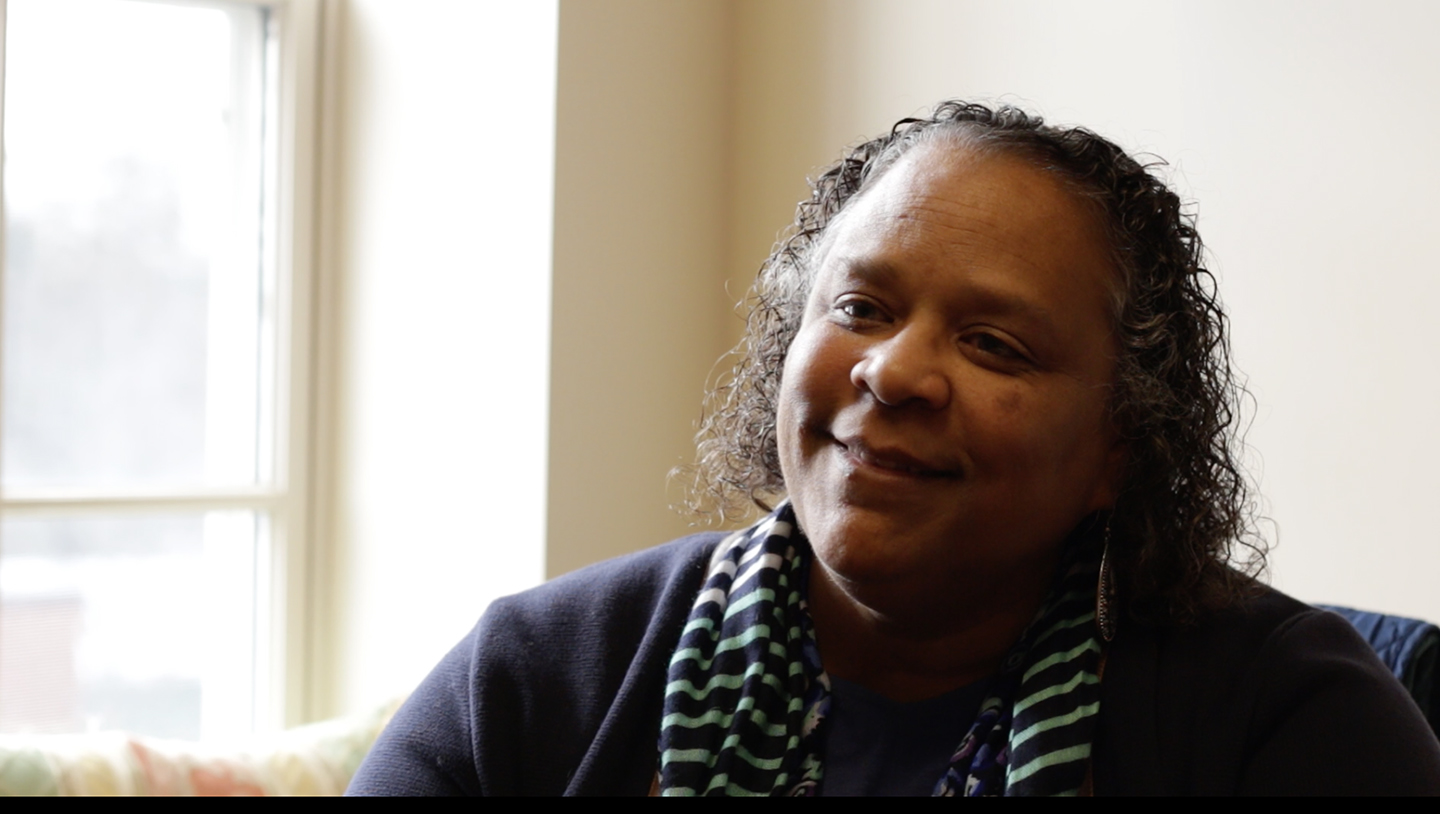 Interview with Regina Phillips: Co-teaching SSW's Empower Cultural Education Course with Arabella Perez
Interview with Regina Phillips: Co-teaching SSW's Empower Cultural Education Course with Arabella Perez
Regina Phillips, M.S.W., recently received her degree from UNE. She has a B.A. in Psychology from Curry College, Milton, Mass. She currently works for the Westbrook School Department as their Grants and Community Engagement Coordinator. Prior to that, she managed the City of Portland’s Refugee Services program where she supervised a multi-cultural/multi-lingual staff that provided case management, housing, employment, life skills and other services to new Americans. She also ran the city’s homeless family shelter. Ms. Phillips worked for the City of Portland for 19 years. She serves on the Board for United Way of Greater Portland and Coastal Enterprise, Inc. and was a previous Board member at Family Crisis Services. Ms. Phillips is a long-standing member and Executive Committee participant of the Greater Portland Chapter of the NAACP until it disbanded in 2017. She served as the Education Chair for many years and she helps organize the annual Martin Luther King Jr. breakfast celebration. Ms. Phillips is excited to work with designers and faculty to assure the relevancy of course materials to Maine and beyond.
Meg: Can you tell me a little bit about your background experience as it relates to this course?
Regina: Well, to start, I was born in the 60’s. My father went to the march on Washington, and when he came back from the march, he started the- or he revived rather- the NAACP, Portland branch. Cultural awareness, race relations and inclusion and diversity — all of these things have always been a part of my life since I was born. I went to school in Boston. I have a degree in psychology and I worked for Westbrook College, actually — in the children’s program, went to work for the Peoples Regional Opportunity Alliance, currently known as The Opportunity Alliance, and then about 19 – 20 years ago I got a job working for the city of Portland, working in their homeless shelter. After being there for 7 years, I transferred over to the Refugee Services Program within the city of Portland. For 12 years I was the Refugee Services Program Manager for the Refugee Services Program within the city of Portland. It was very very unfortunate though that our program ended because we lost a lot of our funding and so when that happened the city didn’t pay for the program and therefore the program shut down, and that’s how I found myself in Westbrook, where I work as a Grants and Community Engagement Coordinator for the School Department.
Meg: And how did you get connected to UNE?
Regina: I was very lucky to have worked with several people at UNE through managing interns as Program Coordinator for Refugee Services. So I got to know a lot of the professors. One of them who is no longer here said to me, you know we have a diversity scholarship, we’d love for you to come and be a student. And so I jumped at that opportunity. I loved being a student, bam am thrilled to find myself in a different kind of a position, teaching. It’s so exciting! I’ve done presentations and workshops, but never had the opportunity to teach a class. I’ve known Arabella, gosh, maybe 10 years. She happens to be a very very close and dear friend of my sisters and she just gives me so much positive energy, so I’m just thrilled at the thought that we’ll be doing this together.
Meg: How did you first hear about the course?
Regina: I first heard about this course from Arabella. Her and I were working together to do a training — a cultural education and awareness training at Woodfords Family Services. Woodfords contacted Arabella because they’d worked closely with her in the past. They were experiencing an increase in refugees and immigrants needing services and were trying to figure out how to better train their staff. So, given my background and experience running refugee services, Arabella called me and said “hey, do you want to do this with me?” and I said, “Yes absolutely!” We, Arabella and I, had talked in the past about how as a student, I was surprised not to see a cultural education or awareness class at UNE. There wasn’t one that I could take, so we had had those conversations before. As social workers graduate with a BSW or an MSW, especially here in Portland, Maine, where more and more refugees and immigrants are coming here, they need to know what their background is, and what their education, experiences and struggles are. So I’ve had that conversation with Arabella about UNE taking that on, or picking that up. So then she mentioned this course, saying UNE’s School of Social Work had applied to get funding to draft this course alongside community leaders and I said, “I’m very interested!” I met with Director, Shelley Kohen Conrad, and the rest is kind of history! At that point I asked them if I could bring on Deqa Dhelac. I work very close with her. She was a part of my staff at Refugee Services. She also has an MSW from UNE and she obviously brings a different perspective from myself, being from Somalia. She also has great experience and a history that I don’t have, you know living in Somalia and being outside of the United States. So we brought her in and it worked out!
Meg: Great! Can you speak a little bit about the collaborative experience of designing this course? For example, was there anything you found particularly surprising or unexpected throughout the process?
Regina: You know, not really actually, (pauses) You know, however we came together, I thought was so dynamic. I had known Micky Bondo. I had known Mufalo Chitam, and obviously I knew Deqa and Arabella well, so I knew the players in the room, so to say, but the thing that really got me was really Shelley at the first meeting — she explained everything so well and the comfort level that she was able to display of “we’re all in this together” you know, “we want to hear from you all. We want to hear what your experiences are, whether that’s good or bad” was wonderful. So everybody kind of knew what they were dealing with. Just the honesty and the comfort level she brought to that very first meeting was wonderful. Because you know, for me it wasn’t first impressions as I had worked with almost everyone in some capacity, but certain ways in which you set things up really sets the tone, and I just felt that Shelley set this tone of comfort: “It doesn’t matter where you come from, what your struggles are, we want to hear it. We respect it. Be honest and open about it. Again, whether it’s positive or negative, we want to know.” Sorry! (laughs) I wish I could give you something that was shocking or unexpected, but I guess for me, it just went so smoothly (laughs again) yeah, it really did.
Meg: Well that’s wonderful! No need to apologize! We just want to capture your honest reflections! What about most rewarding? What did you find most rewarding about the process/experience?
Regina: The thing I found most rewarding was again, just the people in the room. I got to know Micky a little bit better. I got to know Mufalo a little bit better. I have the utmost respect for both these women. Now I get to also work with Mufalo as she becomes the Executive Director of the Maine Immigrant Rights Coalition so I’m very very happy she’s there and that I get to continue to see her. Deqa and I, we’re very very good friends and I consider her almost a sister to me. But really, all these people — working with University of New England, again, I’d known Arabella, Shelley I was a student and I had known her through the internships I’d had, working with you, and bringing on Malual and Kahin. Just the camaraderie of it all was so positive. And we got some serious work done too! Everything that people were able to bring together — the resources and being able to pick apart what was going in or not, and people feeling comfortable to say “yes I agree with that or no, can we cut this out.” It was great.
Meg: That’s great, thank you. I guess this somewhat covers “highlights,” unless you’d like to expound on that at all?
Regina: Well one highlight outside of what I’ve said already was how we were really able to take all this stuff and craft it into a course. I mean, obviously this is new to me, so I would say one of the most impressive meetings I think we had was when we were all around the table, going through all our suggested readings/assignments, and just the way we were all able to go through that process together. Everyone was totally honest. Even if you didn’t necessarily agree with someone’s suggestion necessarily, but it was just very impressive. I just think the group of people I was able to work with was such a perfect pairing.
Meg: That’s so great. So, one of the things I find particularly innovative about this course is that you’re merging community leaders with academic experts, and so it’s really a true manifestation of theory and practice or “the real world” merging in real time. Is there anything you can expound on concerning this?
Regina: Yes yes, the only thing I’d like to add about bringing the theory and community together is that we’re constantly learning. So just because you have folks that are well-educated and experienced, there’s always still so much to learn, so what happens is you have these community folks who are actually helping teach these other folks who have been in the field for a very very long time and then of course you have, you know professors and theorists and that kind of thing that are teaching the community leaders something at the same time without saying “we need for you to come take this class, it’s gonna cost you this much money..etc.” so there’s this mutual respect that goes back and forth. You know, people are eager to learn, so both sides get to learn something.”
Meg: Yes, thank you! In reflecting back on the process, is there anything you would change?
Regina: No, there really isn’t anything I would change.
Meg: Have you ever taught a graduate course before?
Regina: No, I haven’t. I’m really looking forward to it!
Meg: Can you share some of your thoughts as you prepare to teach the course? Perhaps you can start with what you’re most excited and/or anxious about?
Regina: Yes, I’m excited about teaching the course because it’s nothing I’ve ever done before. I’m eager and excited to teach the course also because I know I’m going to learn so much more. I like giving presentations and I like working with people. I love working with Arabella also, so I’m really excited she and I can do this together. And the students — I think it’s going to be great- again, it’s nothing I’ve done before, so it really excites me!
Meg: Are you anxious about anything?
Regina: You know, just making sure that I show them the same respect that my professors here were able to show me, especially given that people were going to have different views and opinions and you know, that kind of thing. I know it’s going to be a lot of work, so just making sure I keep up and you know always be one step ahead. I don’t know what that looks like at this time, but I know I have to be one step ahead and be constantly prepared.
Meg: In addition to the stated Student Learning Outcomes, do you have any more comments about what you hope students walk away with after having taken this course?
Regina: I hope students walk away with more knowledge about the history, experience, and struggles of all peoples of color, and all people, immigrant and refugees. Even just a little bit, I mean you know Arabella and I were recently going over the week we will teach on African American history, and there’s so much out there, so you know, I sent her an email at one point and I said “I’m overwhelmed, I mean me, as an African American Woman who knows the history — I’m overwhelmed because I know we can’t teach it all, but it’s so important, it just sets the stage for things that are happening today. So I have to kind of pull that back and say as long as they can get even just a few things out of this so that when they go on to get a job, If they become a clinician or if they get a job wherever, that there’s just that much more understanding about the struggles people have faced, all people, not just people of color. And that there’s just a little bit more understanding and tolerance and patience.
Meg: Yes, thank you. On a personal level, I’m curious what the factors in your life have motivated you to pursue this kind of work — what has served as inspiration for you? Particular people, experiences etc?
Regina: Well, I’d have to say, it’s in my DNA. I have three sisters and my father really started us all on this journey when he decided to come back from the march on Washington. And even before that, he’d go down and help register people to vote, so I guess I should say it’s in his DNA and that kind of carried us through. You know, growing up as a child, we didn’t know who was coming over for thanksgiving dinner because if my mother or my father was somewhere and there was a homeless man, and he didn’t have any place to go, guess who was coming to thanksgiving dinner? And so, I was very very lucky to be able to grow up, you know with all of those things, just the social justice awareness, you know employment education struggles. ...But yes, I feel it’s in my DNA. I remember going to a march for Nelson Mandela when I was a little girl...and I remember we had to wait a really long time for him to come out on the stage. I remember saying to my mother “I just can’t wait any longer! It’s just too long!” and my mom just looked at me and said “seriously? this man was in jail for 26 years, and you can’t wait a couple of minutes..” (laughs) so my parents you know, they instilled in us that everyone is on the same playing field. Everyone is one step away from being homeless. It doesn’t matter where you come from, you deserve respect. There are people out there that need our help and why can’t we help them? Why wouldn’t we help?
Meg: Yes. Do you have any final comments?
Regina: I’m just looking forward to the course and I’m very excited that UNE is going to be offering it!
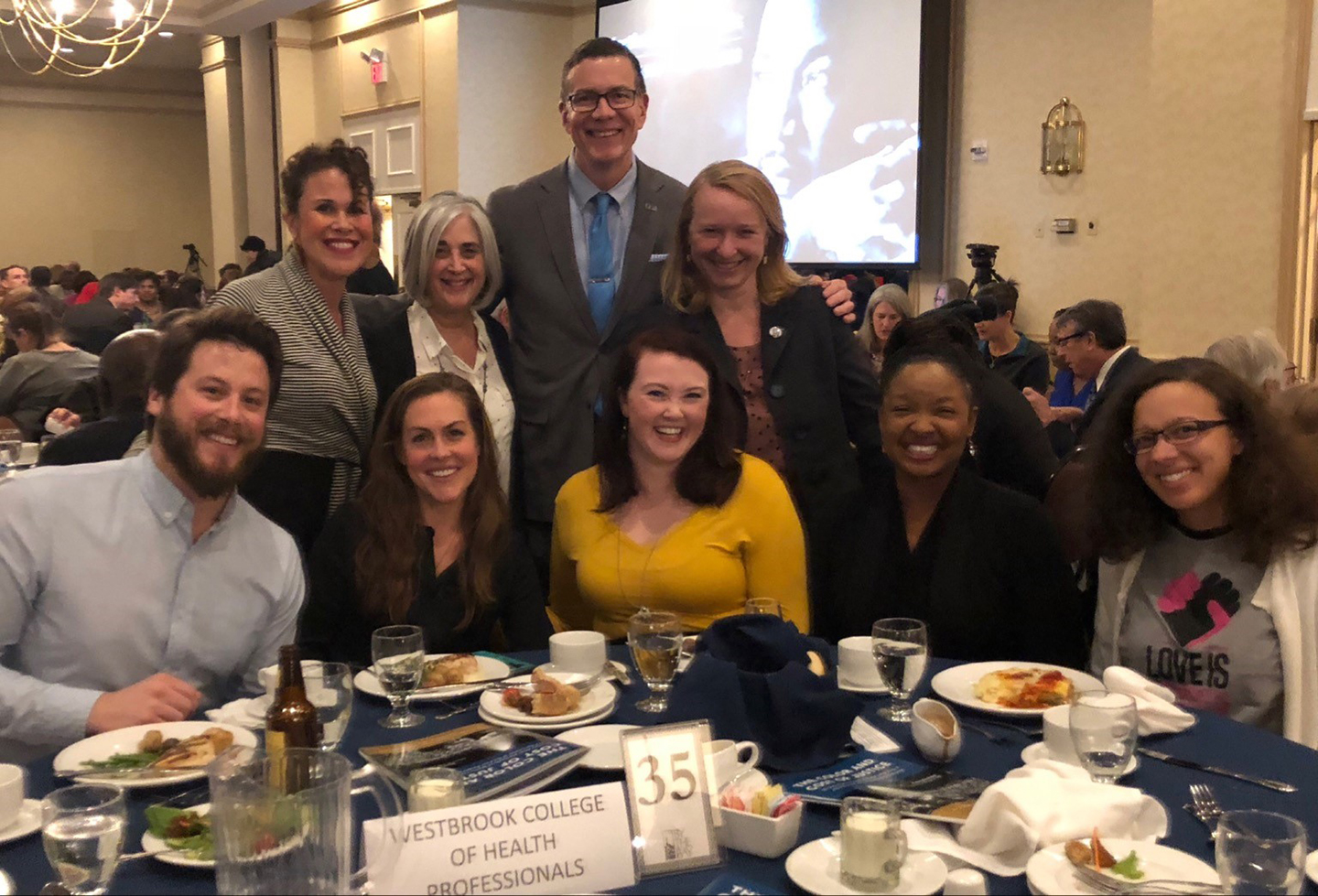 UNE MSW faculty & students attend 37th annual martin luthor king jr. dinner
UNE MSW faculty & students attend 37th annual martin luthor king jr. dinner
Thank you Maine NAACP for organizing the 37th Annual #MLKdinner in Portland, Maine: The Color and Cost of Justice. #SSW Faculty and Students were delighted and honored to gather and feast with fellow community advocates in celebration of all Martin Luther King Jr.'s life and legacy. To quote Rev. Myke Johnson, pastor of the Allen Avenue Unitarian Universalist Church in Portland: “Thank you for stirring up the fires of hope for all of us." Now, let us turn this hope into action!
Administration & Supervision Student Art Activity
The Fall 2016 Administration and Supervision class wrapped up the semester with an art activity representing their leadership aspirations. After a semester-long exploration of the roles social workers take as leaders in the administrative and organizational context, this activity was a playful way to process what they learned about themselves, the challenges social workers face in furthering social inclusion, and the inherent power we all can use to work towards social justice. Each person embodies leadership in their own unique way and the artwork created is a testament to this.
Opportunities & Information
une msw honor society: sigma lambda
Interested in Joining the UNE MSW Honor Society Sigma Lambda? We would love to have you as part of our organization. In order to join you need to be a current student, have a 3.5 GPA, have completed one term of classes, and you must send an email from your UNE account to Vika Johnson and send your transcripts to Jasmin Roden. There is a $30 fee that covers the cost of the certificate and pin and must be paid by cashier’s check or money order only. Once the email, transcripts and money are received, members are added to the UNE MSW Honor Society Facebook page quarterly. Please feel free to post any questions on this page and we will address them.
Honor Society officers are:
- President: Vika Johnson
- Vice President: Alisha Means-Casavant
- Secretary: Jasmin Roden
- Treasurer: Victoria Myers-Beacham
We submit for new members quarterly: January, April, August, and November.
student organization meetings!
Hello fellow students,
Your Social Work Student Organization (SWO) officers are excited for all that will unfold this year on campus and in the community. We want all SW students to come to our meetings and bring your ideas for events, resources to share with colleagues and thoughts on how to best incorporate advocacy, awareness and inclusion on our campus, in our community and in our world. As an organization we want to build a network for the students as they move through this journey. Come and join us for our biweekly meetings:
- President: Caleb Demers
- Vice President: Kendra Page
- Treasurer: Alyssa Wyman
- Secretary: Karri Beling
- GAPSA Senator: Alanna Eaton
- GAPSA Councilor: Katy Finch
- Faculty Advisor: Frank Brooks
We are gearing up for another wonderful semester with the School of Social Work Student Organization.
Please, come and talk with us about what you care about, what is bothering you, what is making you cringe, what is making you sad and what is getting you pumped up. We want to do things for the students and with the students, we can’t do it alone.
SOCIAL JUSTICE ARTWORK NEEDED!
Do you know of an artist or group whose art has a social justice theme? The art can address such themes as poverty, addiction, environment, gun violence, food security and many others! We need new art for the Hersey fourth floor hallway, and perhaps even the hallway near Parker Pavilion! If you, or an artist or group you know, would like to hang their art for a period of two or three months, please contact Lori Power, (207) 221-4493. Many thanks!
CALL TO ALUMNI: STUDENTS NEED YOUR HELP!
If you have graduated from UNE with your MSW two or more years ago, and are interested in a volunteer opportunity that will enhance your skills as a professional social worker, we need you! Our program is full of amazing students who need field instructors for their foundation and advanced field placements. As an alum, you understand the importance of field education and the expectations of students in our MSW program. Our field instructors have flexibility in how field instruction is delivered. You may meet with your student by phone, video conference, or face-to-face. If you'd like to provide field instruction to one or more students, please contact director of field education Kelli Fox. Thank you!
Palliative Care Clinical Social Work Fellowship
The University of Minnesota Medical Center, Fairview, Palliative Care Program announces a twelve month, full time post graduate fellowship in Clinical Social Work in Palliative Care, to begin on or about July 1, 2018. For a program description and application please visit https://www.fairview.org/services/palliative-care-and-support/palliative-care-social-work-fellowship-program or contact Brooke Kaney, M.S.W., LICSW at (612) 273-6191, or bkaney1@fairview.org. The deadline for applications is April 16, 2018.
Office Sublease Available in biddeford
Office Sublease available to share with fellow Social Work Alumni:
Office space available in March 2018 located in the Biddeford Mills. The office space will be available Monday–Friday between the hours of 7 a.m.–4 p.m. Office is occupied in the evenings and weekends. $275 per month for the space: includes heat, electricity, and wifi. For additional information please contact Kara Corbett at corbett.karalyn@gmail.com.
Thank you,
Kara Corbett
Upcoming Events
UNE School of Social Work Alumni Winter Social
Tuesday, February 6, 5–7 p.m.
Join Program Director Shelley Cohen Konrad, fellow alumni, faculty, and students for a winter celebration and reception. Enjoy food and beverages while you check out student projects, get to know the current School of Social Work, and reconnect with the alumni association.
- Address: Alumni Hall, Portland Campus, 716 Stevens Ave, Portland, ME 04103
- Contact: Meg Webster at mwebster4@une.edu or (207) 221-4508
UNE School of Social Work Open Houses
All Open Houses 9–11 a.m., Alumni Hall 107 | Portland Campus | University of New England
- Feb 10, 208
- March 3, 2018
- April 7, 2018*
- May 12, 2018
*April Open House will be at Biddeford Campus, Alfond Science Center 106 (ACHS 106)
Come learn about UNE's on-campus MSW Program! Hear about our innovative and flexible programming, specifically designed to meet th needs of busy people!
At each Open House, individual faculty will present on a topic in their area of study. Field Faculty will provide an overview of our Field Education Program and social work curriculum at large. Current MSW students and admissions staff will be available to answer any other questions.
For more information about each event, please refer to our website: http://www.une.edu/calendar/2018/une-school-social-work-open-house-0
Applied Arts and Social Justice Seminar
March 30, 2018: Field Instructor Seminar (Social Justice Topic)
- 8:30 a.m.–12:30 p.m.
- Ludcke Auditorium, Portland Campus
- Contact Hours Certificates will be provided
- *Alumni Field Instructors and possibly others as space permits
- 12:45 p.m. Alumni Lunch
- Alexander Hall, Nor’easter Cafe
Please RSVP for the Social Justice Seminar with Tiarra LaPierre at tlapierre1@une.edu.
upcoming IPEC events
The events developed by the Interprofessional Education Collaborative are geared toward students but are free and open to the public. For more IPEC events than are listed here, please check the IPEC Events webpage.
Wednesday, February 7
IPE Shared Learning: Naloxone Training and medication Assisted Treatment
- 12–1:30 p.m.
- Innovation 104, Portland Campus
Amidst the ongoing opioid epidemic, two harm reduction tools — naloxone and medication assisted treatment (MAT) — have emerged and can help prevent the adverse health outcomes of opioid use. Learn from local public health and health care providers what naloxone and MAT are, how they work, and how you can play a role in their usage.
- This event can be viewed from any computer via Livestream at http://stream.une.edu/events.
Thursday, February 8
IPE Shared Learning: Faith and Healing: When Chaplains & Health Professionals Join Forces
- 5 p.m., Innovation 101, Portland Campus
- Snow Date: Thursday, February 15
- Reception: Reception from 5–5:30 p.m, event begins at 5:30 p.m.
How do health care centers facilitate the delicate balance between spiritual and physical wellness? Students are invited to a Q&A panel discussion to learn how chaplains in the medical field collaborate with social workers, nurses, doctors and other care providers to better address the health needs of spiritual patients.
Wednesday, February 14
IPE Shared Learning: Recognizing Human Trafficking Victims in Maine
- 12–1:30 p.m.
- Ludcke Auditorium (PC)
- Alfond 304 (BC)
- Both Campuses
Human Trafficking — the coercion and force of individuals into prostitution, domestic and other services through sexual, physical and/or psychological violence — is a significant and unrecognized problem in Maine. Please join us for interactive discussions with Ridelphine Katabesha, Anti-Trafficking Case Manager at Preble Street, to learn how students can recognize potential trafficking victims in field placements/clerkships and the workplace. Preble Street Anti-Trafficking Coalition offers resources to furnish survivors with tools, advocacy and stability for resilience and recovery.
- This event can be viewed from any computer via Livestream http://stream.une.edu/events.
